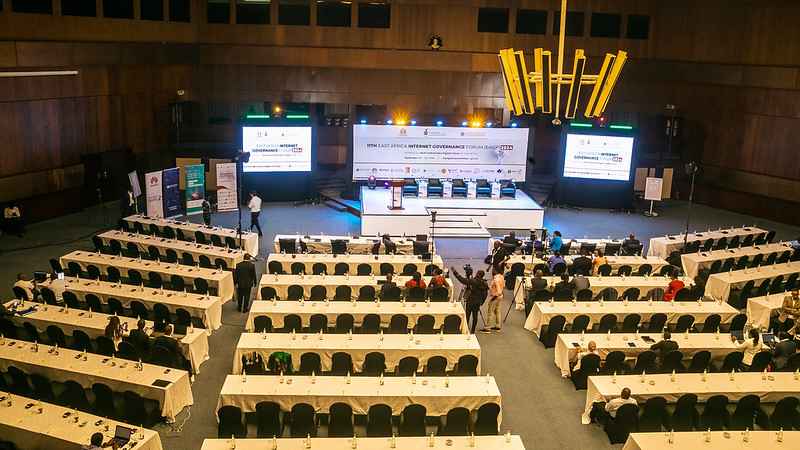By Mary Agolla
The 11th East Africa Internet Governance Forum (EAIGF) at Kampala Serena, Uganda, was not just insightful but served as a powerful reminder of the critical role digital technologies play in shaping our future. From social interactions to business, education, and healthcare, the Internet has become integral to modern life.
The discussions at the forum stressed the urgent need to cultivate policies that allow these technologies to thrive, ensuring they benefit everyone, from end users to professionals in IT, telecommunications, AI, and green technology, among others, who are essential pillars of today’s digital economies.
Key Highlights from the Discussions
Strengthening Digital Infrastructure and Cybersecurity through Cross-Border Collaboration
One major takeaway from the discussions on cybersecurity and data governance was the pressing need for robust policies and frameworks to manage the rapidly growing digital infrastructure across East Africa.
As the region undergoes significant digital transformation, deploying technologies like cloud computing and AI is vital for economic growth.
However, without strong cybersecurity measures and data governance practices, these systems become vulnerable to attacks that could destabilize economies.
Mutheu A. Khimulu, a cybersecurity lawyer, legal specialist and a board member at the African Centre for Security (ACS) Resilience, Science & Technology, emphasized the critical need for harmonizing data governance and cybersecurity policies across borders.
As East Africa becomes more interconnected, the digital landscape faces increasing cyber threats. Effective cybersecurity frameworks must be consistent and robust, not just at the national level but regionally.
Cybersecurity is not merely about data protection, it is essential for fostering trust in our digital ecosystems, as businesses, governments, and individuals increasingly rely on digital platforms.
The rise in ransomware and data breaches in organizations emphasises the urgency of unified strategies to safeguard the infrastructure supporting economic and social development.
From this discussion, my core realization is the critical need for coordinated responses to cyber threats, which transcend national borders. A collective approach among East African nations is critical to ensuring effective regulations, cybersecurity protocols, and data protection measures.
As more businesses move online and e-commerce grows, prioritizing data privacy and cybersecurity will be crucial to building trust and ensuring long-term digital prosperity. In summary, cybersecurity is not just an IT issue, it is a cornerstone of digital governance and economic security. Addressing it collectively is essential, otherwise, the innovations intended to advance our progress may become liabilities.
Green Technology and Sustainability
Another critical discussion during the breakout session titled “The Green Tech Revolution: Multistakeholderism for Sustainable Climate Action in East Africa” focused on how digital infrastructure can align with green technology for a sustainable future.
East Africa, particularly Kenya, leads in renewable energy through geothermal power, yet the integration of green technologies into our digital framework is still in its early stages.
Digital innovation has the potential to enhance climate resilience through sustainable agriculture, renewable energy solutions, and smart city infrastructures.
AI and IoT (Internet of Things) can be leveraged to monitor climate trends, optimize resource use in urban areas, and promote sustainable practices.
However, this requires significant investment in green infrastructure. The forum highlighted the importance of multistakeholder collaboration, ensuring that governments, the private sector, civil society, and academia work together to fund and drive innovation in green tech.
As we build our digital future, aligning these innovations with sustainability goals is essential, creating an ecosystem where economic growth and environmental conservation coexist.
The Importance of Data Governance
During the high-level panel “Building Our Multistakeholder Digital Future for East Africa,” Mercy Ndegwa, Public Policy Director for East & Horn of Africa and Economic Policy Lead for Africa at Meta, discussed how platforms like Facebook and Instagram drive economic growth through e-commerce and fintech.
She stressed the need for policies that protect user data while fostering innovation. Strong governance structures create a safe environment for users engaging with these digital platforms.
Data protection frameworks are also critical in the realm of intellectual property, where the digital economy intersects with creativity and innovation. The insights I gained at EAIGF reminded me that as we advocate for digital inclusion, we must also ensure that innovators’ intellectual properties are safeguarded, fostering an environment where creativity can thrive without fear of exploitation.
Fostering Digital Inclusion for Economic Transformation
At the heart of the forum was the message that digital inclusion is key to transforming East Africa’s economy. Access to digital tools is no longer a luxury but a necessity, particularly in sectors like education, healthcare, and small business development.
Through digital platforms, small businesses can access global markets, students can acquire new skills, and healthcare providers can offer remote services. This is the power of the internet. However, achieving this requires investments in both infrastructure and digital literacy, as well as ensuring affordable internet access.
Governments and the private sector must collaborate to ensure that no one is left behind. The discussions on multistakeholderism in addressing these challenges were eye-opening, reinforcing the idea that collaborative approaches are the only way to truly unlock the potential of the digital economy.
The Path Forward
The East Africa Internet Governance Forum was a pivotal moment for reflecting on our digital transformation journey and the road ahead. The insights shared, particularly around cybersecurity, data governance, green technology, and digital inclusion, are crucial as we continue to build a resilient and inclusive digital future for East Africa.
As someone in the IT and networking sector, I left the forum with a renewed sense of responsibility, not just to implement these technologies, but to contribute to the governance structures that will sustain them.
The future of our region depends on it, and I look forward to continuing these conversations and being part of this transformative journey.
Mary Agolla is an Enterprise Presales Professional at Copy Cat Group
![]()




